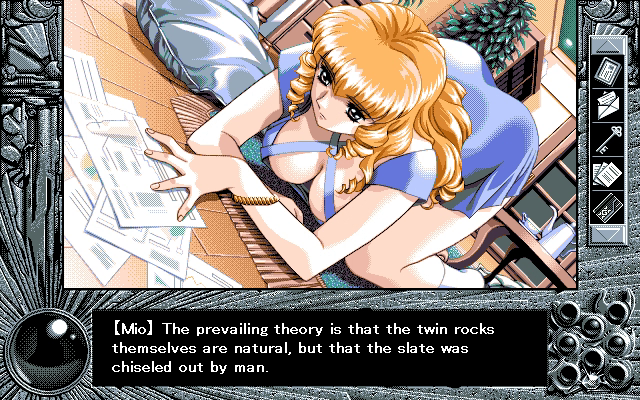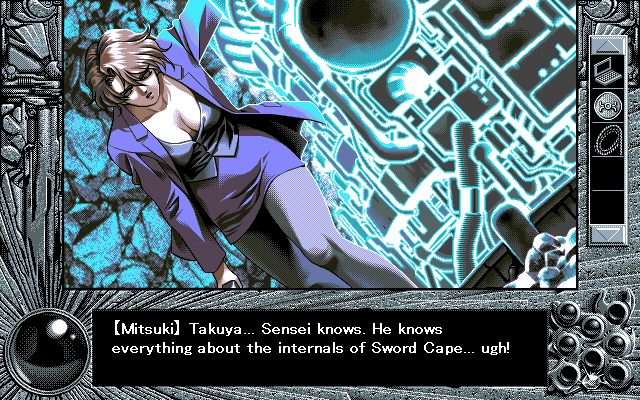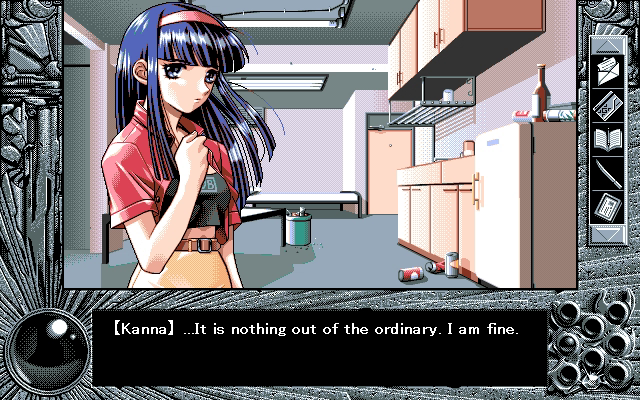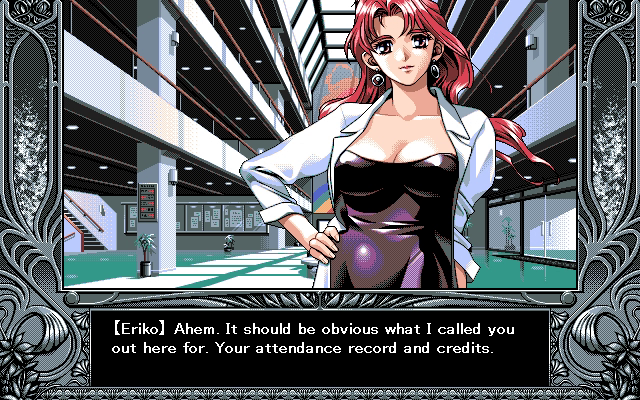The characters of YU-NO overall receive sufficient development to rise above the typical archetypes many of them seem to embody in the (somewhat) deceptive Prologue. Eriko subverts her ostensive role as a goofy school nurse, as I described, and Kaori is not the reporter she might appear to be if she didn’t walk around almost topless.
Mio appears to be a tsundere ojou-sama rich girl whose crush on Takuya, despite his constant sexual harassment, he is too oblivious to perceive. But Mio is responding to the emotional trauma of walking in on Takuya having sex with a teacher (Mitsuki) in the school and her complicated feelings for both him and his friend Yuuki while attempting to lead an independent life despite her stifling and explosively angry Koudai-like father. With reckless daring, Mio runs away on an adventure to prove Koudai’s theories about the Celestial race (he learned a lot of the information from Takuya’s mother, Kaytia). Takuya and Yuuki search for Mio until she possibly dies alone, another victim of the caves beneath Triangle Mountain, or until, on her route, Takuya and her find an escape.

Mitsuki appears to be an older teacher whom Takuya relies on for life advice. But she is actually his former sexual partner and now Ryuuzouji’s brainwashed slave piecing together clues about the real Ryuuzouji’s grizzly fate while tortured by the conflict between her own desires and this devil that increasingly controls her body to both sexually exploit her and use her as an assassin—one of the two major horror threads of the plot. That said, the scene in which Mitsuki and Takuya wax nostalgic about having sex in the school history lab cracks me up—ah, remember the sex crimes that should have got Mitsuki fired and arrested? Weren’t those the days? It is bizarre that Mitsuki, apparently a much older woman, has what the script treats as a wholesome, sincere romance with her teenage student (!). And Takuya can’t care too much about Mitsuki if, later on the same route, he can get off to Ryuuzouji raping her in the same room.

Kanna appears to be a Rei-like emotionless new girl, bullied for her strangeness, whose timid quietness conceals a passion for environmentalism and a strange spirituality. Less of a subversion, since it is clear from the start, is that she has some strong connection to Takuya, watching his activities. But the bullies are correct that Kanna is a prostitute, and Kanna proves deeply sad, bold, and (most shockingly) has a bit of a sense of humor. Kanna is quiet because she is a friendless, depressed immortal who is about fifty years old and defends Triangle Mountain out of love for her deceased mother, Amanda, who came from Dela Grante like the mountain did and taught her a religious veneration for the Hypersense Stones beneath it whose energy she depends on to survive. Her tragic situation, pathological emulation of intimacy through sex, and flashes of weird humor make Kanna standout—as do her sense of style and long, dark hair. She is even the only of the different partners Takuya can pursue to not have a big bust and big hips, adding a small amount of body diversity.

The exception to Kanno’s playing with expectations are the major women of the Epilogue, Sayless (“Celes” in the remake) and Yu-no. These vacuous blobs pandering to Takuya’s incest obsessions are easily the worst characters. So naturally they are the characters the game wants the player to love most. Takuya is the third-worst character. Sala, a bit player in the Epilogue, might be the fourth worst if only because she is unnecessary and forgettable beyond her awful sex scene.

However, few among the cast are particularly appealing. Eriko, Kanna, and Kaori stand out for not being boring or evil. Granted, Kaori is probably evil, but evil in a fun Mine Fujiko way instead of a rapist, murderer, or torturer kind of way. (Mine Fujiko is only these things in some interpretations.) I remain unsure if Eriko and Kanna are genuinely likable or if they came off that way because of the other characters I spent hours around.